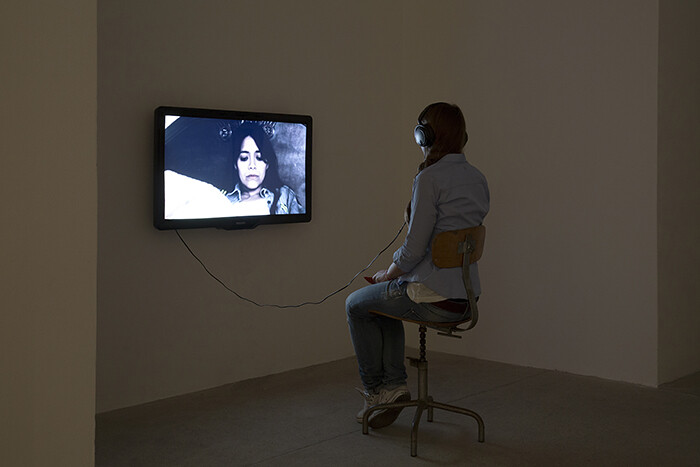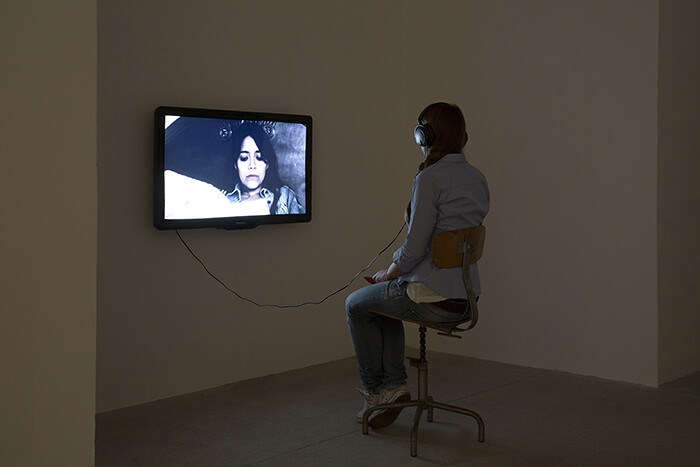Keren Cytter hypnotized me twice in the past few weeks. And I liked it. The first time was in London, where her audio piece Constant State of Grace (2014) was installed in a busy corridor at Frieze Art Fair.1 Headset on, I was asked by a robotic voiceover to let go, to embrace the fact that someone or something else was “taking over,” and to “overcome [my] feelings”—of being lost in the supermarket, in my case. Combined with an acoustic loop of binaural beats, which stimulate brain waves to induce relaxation and meditation, the voice instructed me, instead, to enjoy the “smiling faces” and “foreign landscapes” of the fair: a soothing, creepy, and hilarious antidote to the cupio dissolvi [wish to be dissolved] in the surrounding sea of consumption.
It happened again at the artist’s second solo show at Galleria Raffaella Cortese in Milan, when I sat alone in front of Cytter’s latest video, Ocean (2014).2 Watching alone was not a personal choice: the work, displayed on a monitor, includes only one set of headphones and one office chair, so intimacy is coerced from its viewers. This prescriptive one-to-one condition recalls the setting of a therapy session, or one of our daily intercourses with communication devices and operating systems, where subjectivity, consciousness, alienation, and loss of control regularly come into play.
Ocean opens with the written instruction, “Place your head here and your shoulders here,” whose letters compose the profile of a figure; the spectator is required to adjust, like in a subway photo booth. Then a voice starts: “If you don’t want to drown, be an ocean. You are waking up to the sound of the waves [seagulls in the background]. Your mind is an island. You are facing reality by yourself. Relax. Concentrate on the screen in front of you and face your own reflection.”
The story, whose fractured plot is told from different voices and individual viewpoints, as per usual with Cytter, takes place in a beach house. It involves a few characters, some of whom are lovers; a lonely boy; a bit of sex; several dialogues; and passionate kissing next to a bonfire, accompanied by the sticky romanticism of Leonard Cohen’s song Undertow. The voiceover, at one point coupled with the same pulsating binaural beats as Constant State of Grace, repeats instructions on what to do and how to feel until the circular logic of the video closes in on its last words: “Concentrate, look at your reflection. You are relieved. Your mind is empty. Your thoughts are public. […] You recognize your reflection and smile with the embarrassment of a blind date. Relax. Your mind is now an ocean.”
Cytter asks viewers to keep their eyes wide open, while voices whisper and sirens sing. Wake up, sleepy consciences! In “Under the Influence: Hypnosis as a New Medium” (2012), Pascal Rousseau analyzes a series of contemporary practices to frame art’s “hypnotic paradigm.”3 Significantly, Rousseau comes to the conclusion that “today, in a shift confirmed by brain imaging, hypnosis no longer appears as a sleep of consciousness, but on the contrary as a state of “paradoxical wakefulness,” “a heightened vigilance”—an apt parallel to Cytter’s guided exercises in self-awareness.
The exhibition’s aquatic echoes are recursive. On the opposite side of the gallery from Ocean, hidden by a theatrical set of four monochrome drawings on white vinyl leather fabric, hanging like curtains—a round portrait of Tim Buckley (Tim Buckley, 2014), a tire (Black Wheel, 2014), a red hand holding a red flower (Red Hand, 2014), and a blue bouquet of flowers (Bouquet, 2014)—is the video projection Siren (2014). Its soundtrack fills the space. Again, a song is pivotal: this time, it’s Song to the Siren, originally performed by Buckley in 1968 and frequently covered by other singers. The video includes both the first version and Brian Ferry’s instrumental adaptation from 2010. One of the video’s possible synopses could be: murder story. Or: parable on the dangerous effects of self-exposure. Cytter combines first-person narration, screenshots, chatrooms, YouTube, and basic visual effects, like showers of flowers and cute colors decorating the gore of dripping blood. “How did you do it?” asks one character in dialogue. “Video FX live,” says another.
Cytter loves to flirt with the codes of psychological thrillers. Complex relationships end up in homicides committed by multiple culprits. Relational anxieties generate guilt complexes. It is a frightening ocean in which to drown, full of dangerous undercuts. Fortunately, black humor abounds, and if the female body is the poster girl of the attention economy, Cytter claims her rights to vengeance (Vengeance [2012–13], was also the title of her recent seven-episode video series.) “Women are victim of an old social system. The second I saw how he was talking to you I knew it was time for a change. An act of revenge must be realized,” says the female protagonist, who convinces her lover to stab a misogynist. In the final scene, Buckley sings, “Sail to me, sail to me,” while the camera zooms in on New York’s Times Square on a cold winter’s day: a video wall lights up to remind everybody that it’s Valentine’s Day, before the message is replaced by two giant ads for Coca-Cola and Samsung, immediate commodifications of romance.
In the last scene of Ocean, a male character finds an iPhone buried in the sand. It shows a low-fi video of the same scene he is watching: warm sand, calm sea, blue sky. The perfect screensaver, the epitome of our self-absorption in the digital samsara. In the meantime, the voiceover declares that our “healing process” is completed and assures that we “will be protected from all danger.” Current communication devices do their best to present themselves as soothing transitional objects, things we are supposed to own, pet, and hold to feel better and always perfectly connected, inside out. And yet, after Cytter’s hypnosis, I can’t relax. I can’t feel safe. I’m still drowning. Paradoxically, I think the hypnosis worked.
One of three pieces included in Frieze Sounds 2014, Cytter’s work was originally developed for the same program at this year’s edition of Frieze New York. It can be streamed online at http://www.friezeprojectsny.org/sounds/keren-cytter.
The video was commissioned by ArtAids for the exhibition “Perfect Lovers. Art in the Time of AIDS,” Foundació Suñol, Barcelona (until January 24, 2015).
Pascal Rousseau, “Under the Influence: Hypnosis as a New Medium,” in Documenta 13: Catalog 1/3, The Book of Books (Ostfildern: Hatje Cantz Verlag, 2012), 517. Rousseau cites examples ranging from Matt Mullican’s Performance: Under Hypnosis (1982) to the traveling “Hypnotic Show” (2008–ongoing) organized by Raimundas Malašauskas and Marcos Lutyens, though I was very sorry not to find Linda Montano’s Talking about Sex While under Hypnosis (1975) among them.










